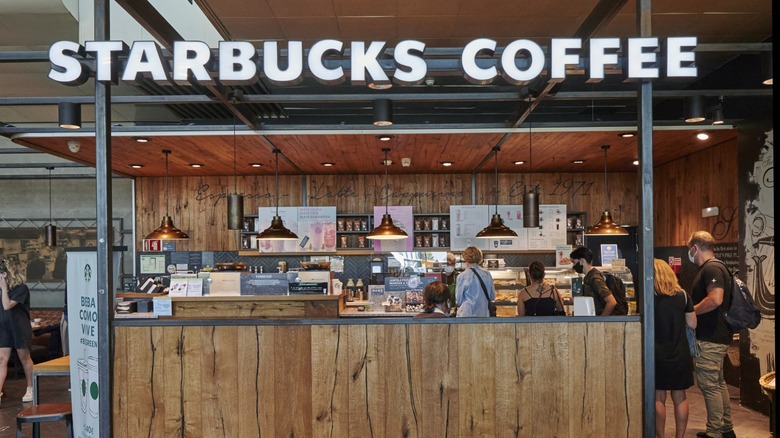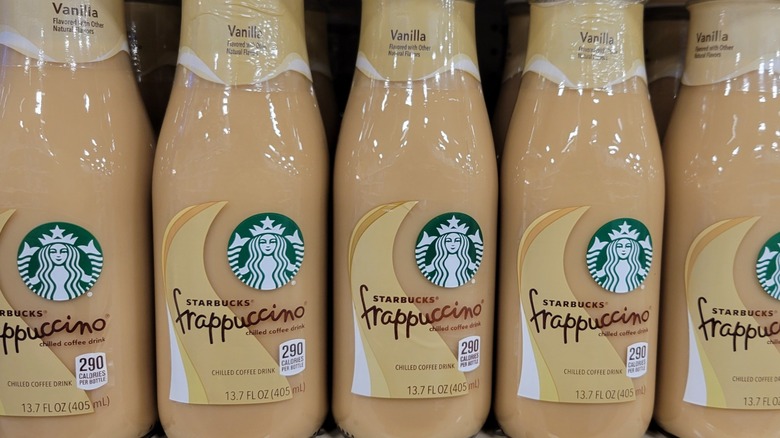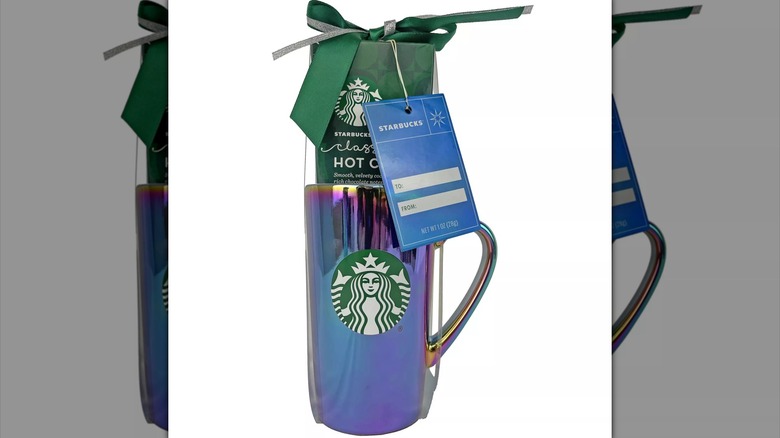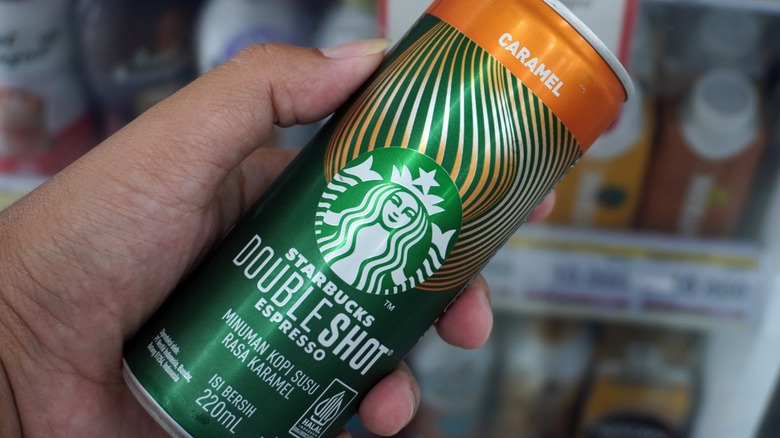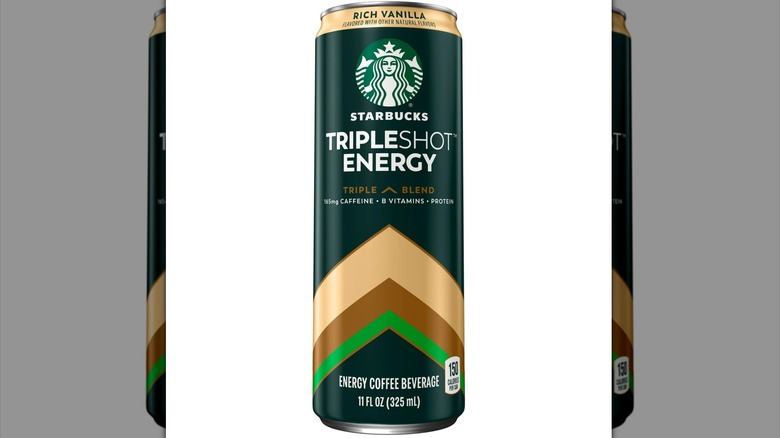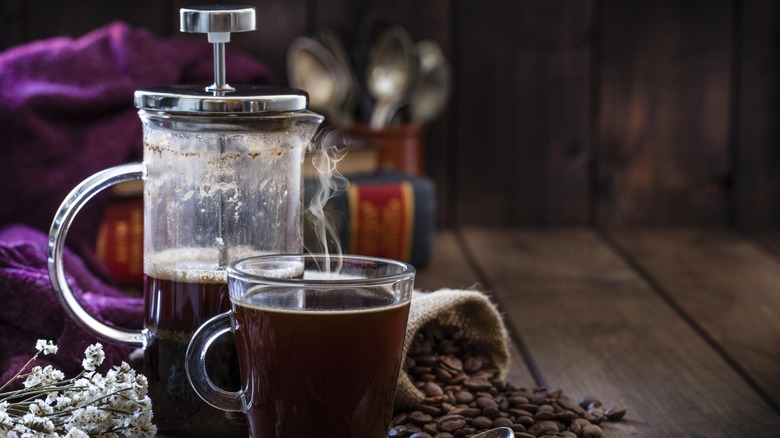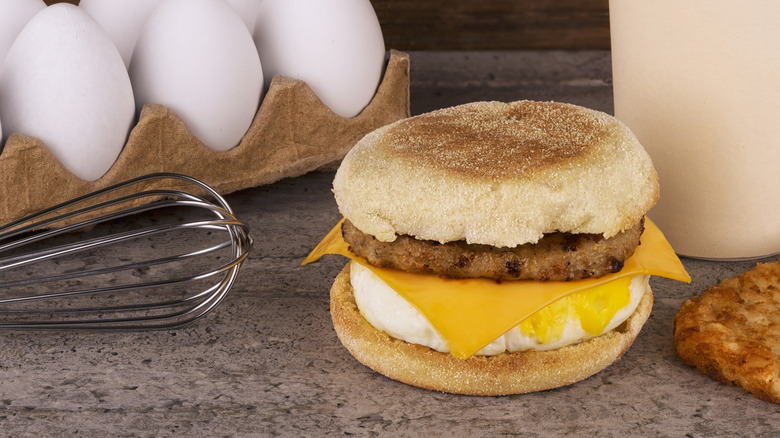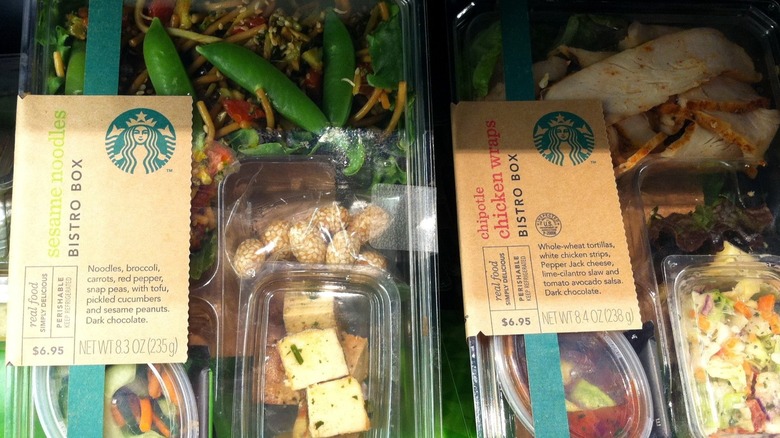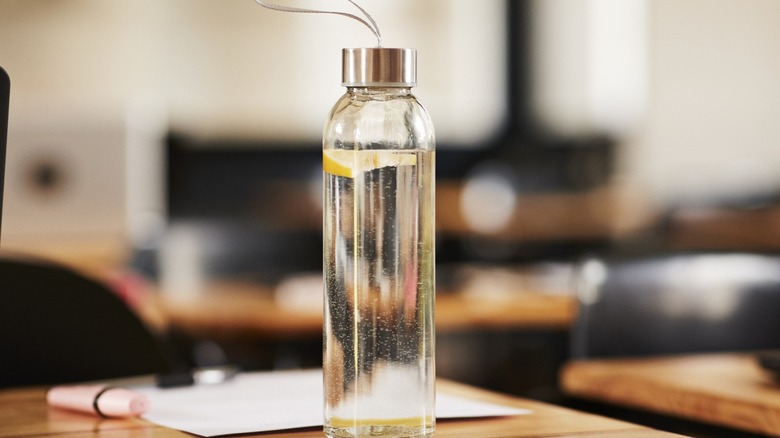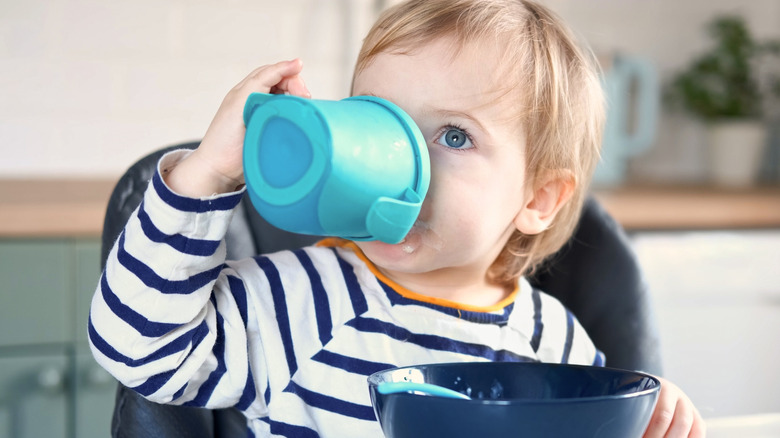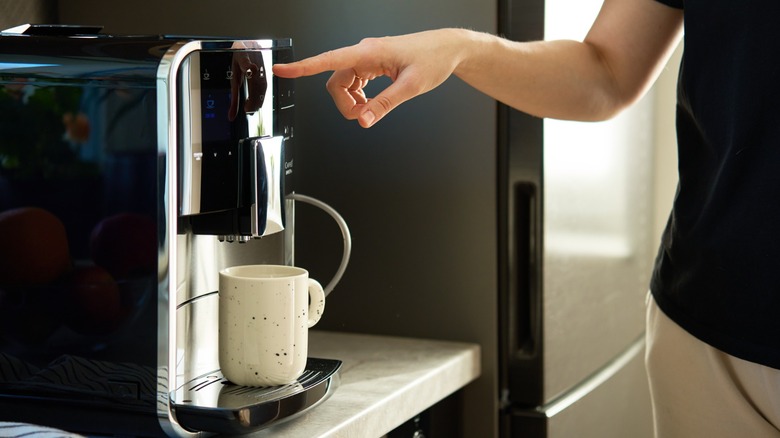10 Major Starbucks Recalls That Shook The Franchise
We may receive a commission on purchases made from links.
Having been on the coffee circuit for more than 40 years, java giant Starbucks has seen more than its share of product recalls. The more the brand has expanded into sectors like home goods and grocery products, the higher the probability of snafus that send the supply chain into a tailspin. When it happens, it's not just Starbucks that's impacted; it's retailers, coffee shops, and customers who end up in need of fast action to make sure everyone impacted stays safe and secure. Beyond the shady things about the Starbucks menu, there are also the dodgy — though unintentional — issues that arise to make recalling items a necessity for the sake of customer safety.
Through the decades, Starbucks has seen its share of high impact incidents that could potentially jeopardize the health and well-being of its customer base. A quick search reveals a laundry list of scenarios that have caused operations to pump the brakes and roll the tape backwards. Whether it's due to bits of glass that could have been floating around in a bottled beverage or tainted food that might have made its way into a customer's digestive tract, some of the largest recalls in Starbucks history have put the company on its back foot and caused more than a little headache and heartache for one of the most trusted names in commercial coffee.
Bottles of Vanilla Frappuccino (2023)
Grabbing a simple bottle of Vanilla Frappuccino to get yourself a little caffeine jolt sounds like a simple prospect. But when there's more in the bottle than just tasty coffee and a little rocket fuel, the possibilities for injury suddenly become much more real. Starbucks found out when it was forced to recall 25,000 cases — over 300,000 bottles — of Vanilla Frappuccino bottled drinks that had gone out to a number of retailers with possible pieces of glass floating around in the liquid. PepsiCo, distributor of the beverages, issued the notice voluntarily after the offending glass pieces were discovered.
The nationwide pullback began on January 28, 2023 and ended on July 20 of that year. There were no U.S. Food and Drug Administration (FDA) reports of injury to consumers, which surely drew a sigh of relief from the Starbucks bigwigs. As much as starting the day without a chilled blast of your favorite bottled swig might not have been ideal for anyone impacted, inadvertently swallowing glass obviously would have been a far worse situation.
Metallic Mugs (2023)
Imagine all the happy holiday revelers ripping open wrapping paper to discover Starbucks mugs and beverage mixes waiting. That happy scene was cut short after Christmas 2023 when a potential hazard was identified with a specific mug adorned with an iridescent metallic coating: The mugs were prone to breaking if filled with hot liquid or heated in the microwave, which is pretty much the core purpose of a mug. Warnings of possible lacerations and burns were issued and a massive recall was announced on March 21, 2024, long after the holiday season had ended.
How extensive was this post-Yuletide product recall? A visual image might illustrate it best. Picture 40 coffee mugs sitting on your kitchen table, all marked with Starbucks' green siren logo and filled with drink packets like the perfect Secret Santa gifts they were intended to be. Now multiply that by 110,000 and see if you can fit the 440,500 pieces involved into your brain space. It's pretty wild, isn't it? The perils of accidentally overheating any of these imagined items would have been enough to inspire coffee lovers to revert to disposable Starbucks cups to avoid injury.
Cans of Doubleshot Espresso beverages (2022)
There's no way a corporation as responsible as Starbucks would consciously allow pre-made beverages posing a potential public health hazard into the supply chain, but sometimes it happens despite a company's best intentions. In 2022, Starbucks learned that its canned Doubleshot Espresso beverages had gone out of the factory with inadequate sealing, leading to a massive recall of product that should never have made it onto the trucks. Once the situation was discovered, a recall was enacted to remove the dubious drinks, pronto.
It wasn't a modest collection of cans that were destined for return, either; over 250,000 cases — not bottles, but cases — were marked for pull-back to keep Starbucks fans from running into potential issues with foodborne illness. The health impact of accidentally drinking one of these beverages may have rivaled swigging the ill-advised 48-shot espresso Starbucks drink that you definitely shouldn't try. It's good to know that food safety soldiers are on the lookout for simple errors like inadequate seals that could turn your otherwise happy java experience into a stomach-turning moment you'd rather avoid.
Vanilla Espresso Tripleshot (2022)
All any self-respecting Starbucks customer wants is a tasty, chuggable energy infusion from whichever beverage they favor. When the concoction is a Vanilla Espresso Triple Shot that comes with bits of metal included free of charge, the prospect of downing one for a bold boost becomes fraught with potential for injury. It happened in 2022, when cases sent to seven states were found to have possible contamination of metal fragments. PepsiCo issued a recall on August 15, followed by an FDA notice that arrived on September 8 in a concerted effort to get the impacted product away from markets where consumers could have been making perilous purchases.
Though this situation absolutely throws up a safety alarm that shouldn't be ignored, the recall wasn't as large as some of the other Starbucks notifications. But even if the pull-back only involved 221 cases, the damage those possibly-tainted bottles could have caused was averted thanks to the accuracy of a tracking system that could hone in on the lot that may have been affected. So while this Vanilla Espresso Triple Shot recall may have left shelves empty temporarily, the benefits of not taking chances with consumer health was undoubtedly worth the trouble.
Coffee Presses (2019)
For Starbucks fans eager to have a more direct coffee experience, coffee presses are the perfect device. When they work properly, you can create personalized signature brews, avoiding unnecessary questions for your barista by tinkering with roasts and blends on your own. But when the products become disassembled during use, there's no question it's time to stop the presses, as the colossal coffee company learned in 2019. A partnership with coffee press creator Bodum resulted in a Starbucks French press that was prone to having its plunger knob snap off; eight reports in the U.S. and one in Canada proved that it was no one-off, but a trend that required intervention to keep other consumers safe while creating their coffee.
The products had been on shelves and in online listings between November 2016 and January 2019, creating a two-and-a-half year period of movement into consumer hands. Somewhere in the neighborhood of 230,000 presses sold in the U.S. and another 33,200 or so sold in Canada, creating a recall of epic proportions that eventually extended to Europe, the Middle East, and Africa. Rather than issuing a refund for the faulty item, Starbucks issued instructions for customers to return the press for a store credit, though the item couldn't be returned at the store where it was purchased. The situation also resulted in Bodum suing Starbucks to salvage its reputation.
Breakfast Sandwiches and Cheese & Fruit Bistro Boxes (2016)
It's easy to order small bites from a Starbucks when they shine so prettily in the glass case that houses them. Not all that beauty turns out to be safe for consumption, however, as proven by a two-fold Starbucks recall from 2016, in which sandwiches and bistro boxes were rounded up for disposal due to possible contamination and food allergy dangers. The chain's popular breakfast sandwiches featuring eggs, sausage, and cheese on an English muffin, created by Massachusetts-based Progressive Gourmet, Inc., were the product under scrutiny. Having been sent to 250 Starbucks locations around Arkansas, Texas, and Oklahoma, the sandwiches were recalled on March 4 of that year. Customers may have been a little hungrier for a while, but at least they weren't subjected to an unpleasant foodborne illness.
On the same day, Starbucks issued a recall for its Cheese & Fruit Bistro Boxes due to the inclusion of almonds which may have been mixed with cashews. Since the boxes only went out with a warning for consumers with cashew allergies, the chain took action to remove the items from the Washington retailers where they had been distributed. What a day for a Starbucks recall double-whammy.
Bistro Boxes (2011)
Having a pastry case filled with tasty noshes to go with your caffeinated sloshes helps make a Starbucks visit a full service experience. But in 2010, the prospect of having safe and healthy food as part of that experience was called into question when it was discovered that several popular Starbucks menu items may have been tainted with listeria, that dastardly bacteria known to frequently trouble the food world. Georgia-based Flying Food Group, LLC, had issued a recall involving its ready-to-eat meats, several of which were included in Starbucks Bistro Boxes. Customers looking for a lunch nibble were suddenly in danger of contracting a nasty case of food poisoning.
The meats in question were produced between July 13 and July 24, 2011, with Starbucks being picked up as part of the recall effort on July 19. There were no reports of illness when the recall was issued; the problem was detected during testing of the product. Starbucks chose to err on the side of caution and heeded the recall for the safety of its customers, a drawback that involved anywhere from 389 to 518 items, based on the deliveries made to the locations involved.
Glass Water Bottles (2010)
These days, reusable water bottles usually come in the form of stainless steel tubes and tumblers that resist breakage when dropped. In 2010, Starbucks was marketing water bottles made of glass, selling the shiny vessels in stand-alone locations and coffee shops in Target and Safeway locations. It doesn't take a physicist to see the potential for breakage in such a situation. Removing the bottle's stopper could cause the stopper or the bottle itself to shatter as documented in 10 reports — eight of which detailed customers cutting their hands on broken glass. If the basic function of a product is dodgy enough to cause the entire piece to break, you can guess pretty safely there's a recall looming on the horizon.
Sure enough, the recall notice came on January 28. There were around 11,000 of these wonky water bottles in the U.S. and 1,200 in Canada involved in the recall. Customers were instructed to discontinue use immediately and return to their place of purchase for a refund. And for the trouble caused, Starbucks also provided customers with a free beverage of their choice in any size — a modest compensation for the hassle caused by this tricky product.
Kids' Tumblers (2007)
It may be strange to think about Starbucks as a place where kids go to get their favorite beverages, but the expansion into the family-friendly drink market has made the coffee shop a haven for younger customers over the years. Thanks to themed kiddie cups, Starbucks' littlest coffee shop visitors could carry along a beverage of their very own when accompanying their parents on a coffee run — or, more likely, an apple juice run. But a 2006 run of these tricky tumblers turned out to be less-than-entirely safe for use by the intended audience, showing a tendency to break when dropped and presenting the possibility of laceration as well as a choking hazard. Considering how often these tiny drinkers throw or drop their sippy cups on the ground, there was bound to be quite a bit of breakage.
Starbucks jumped into action on October 9, 2007 and recalled a whopping 250,000 units, offering customers a refund while sweeping the offending tumblers off of shelves. Unfortunately, there were seven reports — including two that involved children who started to choke on pieces of the tumblers — though no injuries were reported. The cute-but-dangerous cups were sold throughout the U.S., which meant the recall went nationwide, with instructions for parents to return their purchases for a full refund and a free drink — Starbucks' standard apology offer.
Home Coffee Brewers (2006)
With so many branded products on the retail circuit, Starbucks has run into snafus with items that take customers completely out of the coffee shop environment and let them enjoy a homebrew experience instead. A 2006 recall required the company to pull back approximately 73,000 of its sleek, stainless-steel eight-cup coffee brewers due to a wiring issue that could have resulted in a litany of fire-related kitchen catastrophes, including overheating, smoking, and plastic burning or melting. You don't need to know the difference between a flat white and a cappuccino to recognize the damper a malfunctioning Starbucks coffee machine could put on more than just your morning coffee moments.
The recall was issued on October 17, after 23 reports of plastic housings melting on the brewers. These items had been sold from March 2005 through September 2006 and rang up at the register at a cool $100.00 or so. This time, Starbucks instructed purchasers to return the brewers via a postage-paid send-in for a full refund plus a coupon for a complementary pound of coffee. The coupon came with an expiration date of January 31, 2007, possibly to prompt quick action from consumers.
